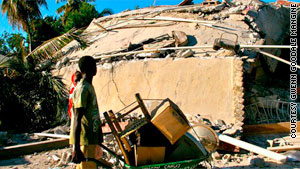PORT-AU-PRINCE (Reuters) - Tensions rose among desperate Haitians awaiting international aid and food that began to trickle in three days after an earthquake that Haitian authorities say killed 200,000 people.
Haiti's shell-shocked government gave the United States control over its main airport to bring order to aid flights from around the world and speed relief to the impoverished Caribbean nation.
Trucks piled with corpses have been carrying bodies to hurriedly excavated mass graves outside the city but thousands of bodies still are believed buried under rubble.
"We have already collected around 50,000 dead bodies," Interior Minister Paul Antoine Bien-Aime told Reuters. "We anticipate there will be between 100,000 and 200,000 dead in total, although we will never know the exact number."
Some 40,000 bodies had been buried in mass graves, said Secretary of State for Public Safety Aramick Louis.
If the casualty figures turn out to be accurate, the 7.0 magnitude quake that hit Haiti on Tuesday and flattened much of its capital city would be one of the 10 deadliest ever.
Health Minister Alex Larsen told Reuters three-quarters of Port-au-Prince will have to be rebuilt.
Three days after the earthquake struck, gangs of robbers had begun preying on survivors living in makeshift camps on streets strewn with debris and decomposing bodies, as aftershocks rippled through the hilly neighborhoods.
Authorities reported some looting and growing anger among survivors despairing over the delay in life-saving assistance. Meanwhile, the United States and other nations rushed to deliver food, water and medical supplies through a jammed airport, a smashed seaport and roads littered with rubble.
FIGHTING FOR FOOD
Hungry residents fought each other for bags of foods handed out by U.N. trucks in downtown Port-au-Prince.
A senior U.N. official warned that hunger will fuel trouble if aid does not arrive promptly, although the law and order situation remains under control "for the time being."
"There have been some incidents where people were looting or fighting for food. They are desperate, they have been three days without food or any assistance," U.N. Undersecretary General for Peacekeeping, Alain Le Roy, told "The PBS NewsHour."
"We have to make sure that the situation doesn't unravel but for that we need very much to ensure that the assistance is coming as quickly as possible so that the people who are dying for food and medicine get them as soon as possible."
The U.N. mission responsible for security in Haiti lost at least 36 of its 9,000 members when its headquarters collapsed. Its two top officials have not been accounted for.
The weakened Haitian government was in no better position to handle the crisis. The quake destroyed the presidential palace and knocked out communications and power.
President Rene Preval and Prime Minister Jean-Max Bellerive were living and working in the judicial police headquarters.
"I do not have a home, I do not have a telephone. This is my palace now," the president told Reuters in an interview.
"We have to make sure there is gas available ... for the trucks collecting the bodies. The hospitals are full, they are overwhelmed."
U.S. PROMISE
U.S. President Barack Obama, who pledged an initial $100 million in quake relief, promised the United States would do what it takes to save lives and get Haiti back on its feet. "The scale of the devastation is extraordinary ... and the losses are heartbreaking," Obama said at the White House.
Obama said the United States, Brazil, Mexico, Canada, France, Colombia, Russia, Japan, Britain and other countries managed to fly in rescue and logistics personnel and supplies. While some aid was getting in, the White House hoped improved logistics would streamline and accelerate the effort.
U.S. Secretary of State Hillary Clinton was due to visit on Saturday to meet with Preval at the airport. U.N. Secretary-General Ban Ki-moon will travel to Haiti on Sunday.
Planes and ships arrived with rescue teams, search dogs, tents, water purification units, food, doctors and telecom teams, but faced a bottleneck at the small airport.
Air traffic control, hampered by serious damage suffered by the airport's tower, will now be handled by the U.S. military with backup from a nuclear-powered aircraft carrier.
The USS Carl Vinson with 19 helicopters arrived off Haiti on Friday opening a second significant channel to deliver help. Navy helicopters had begun taking water ashore and ferrying injured people to a field hospital near the airport.
The U.S. military aimed to have about 1,000 troops on the ground in Haiti on Friday and thousands more in ships offshore. The total will reach 9,000 to 10,000 troops by Monday.
NO WATER, NO SUPPLIES
The Pan American Health Organization said at least eight hospitals and health centers in Port-au-Prince had collapsed or sustained damage and were unable to function.
"We have no supplies. We need surgical gloves, antibiotics, antiseptic, disinfectant," said a doctor, Jean Dieudonne Occelien. "We have nothing. Not even water. We have children out here with dry mouths and no water to give them."
Police were scarcely seen on the streets and although some Brazilian U.N. peacekeepers were patrolling, there were reports of sporadic scavenging, some looting and one report of gunshots in downtown Port-au-Prince on Friday.
At one collapsed supermarket, scores of people swarmed over the rubble to try to reach the food underneath. Just outside the Cite Soleil slum, desperate people crowded around a burst water pipe jostling to drink from the pipe or fill buckets.
Raggedly dressed survivors held out their arms to reporters touring the city, begging for food and water.
(Reporting by Joseph Guyler Delva in Port-au-Prince, Patrick Worsnip at the United Nations, Phil Stewart, Andrew Quinn and John Crawley in Washington; writing by Anthony Boadle; editing by Bill Trott)






